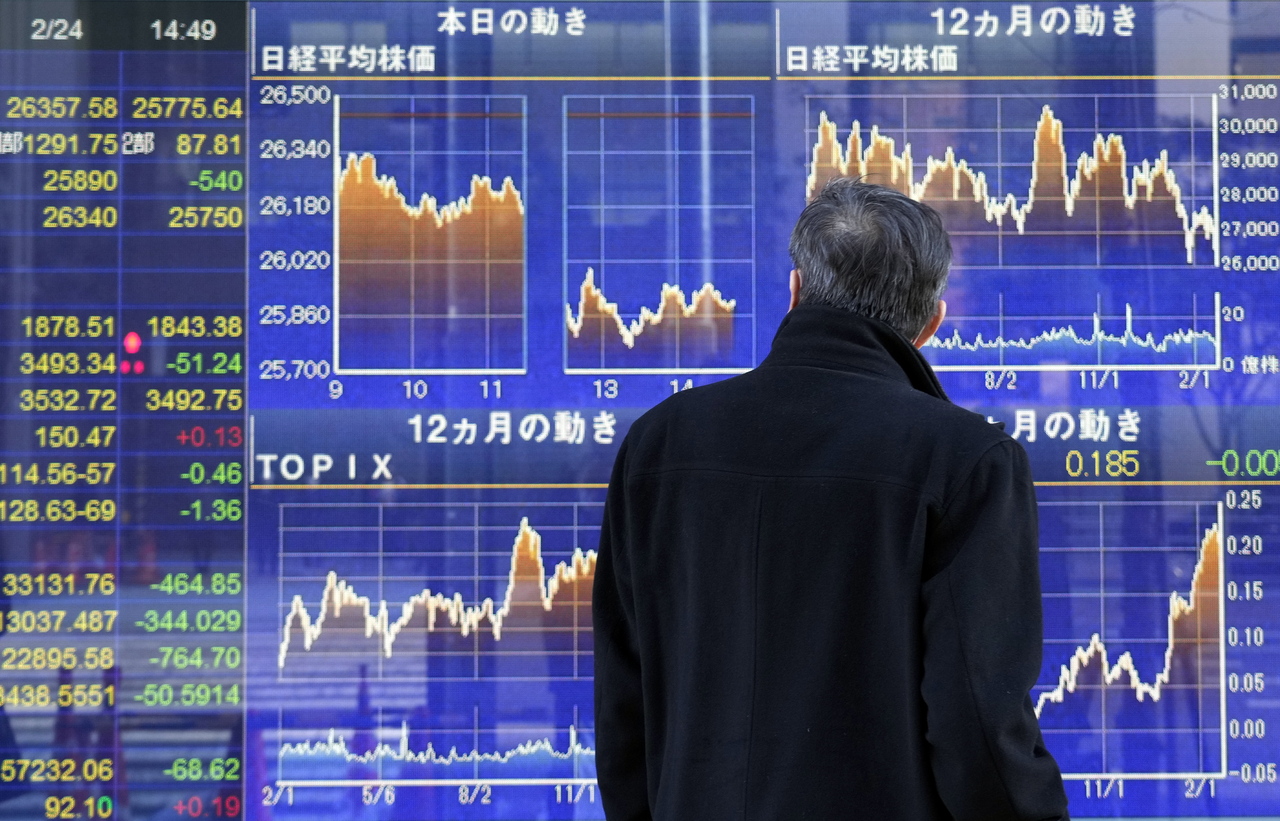Currencies roiled as Russia sanctions ripple in global markets, euro falls 1%
Sign up now: Get ST's newsletters delivered to your inbox

Investors will be keenly attuned to the impact of rising commodity prices and how central policymakers react.
PHOTO: EPA-EFE
Follow topic:
SINGAPORE (BLOOMBERG, REUTERS) - The US dollar rose against virtually every peer as fall-out from the sanctions levied against Russia supercharges demand for the world’s reserve currency.
Traders are hungry to secure dollar liquidity as penalties on Russia’s central bank and lenders reverberate through global markets, with talk that the Federal Reserve may have to intervene in global markets. US and European stock futures fell, while currencies from the euro to the rand dropped.
“USD is king, offering liquidity and safe haven attributes,” said Rodrigo Catril, a currency strategist National Australia Bank. “When trouble hits the road, you need to look for cover.”
The fresh Western penalties further isolate commodity-rich Russia from global finance by seeking to prevent its central bank from using foreign reserves to blunt sanctions. They also exclude some Russian lenders from the Swift messaging system that underpins trillions of dollars worth of transactions.
This drove the Russian rouble down nearly 30 per cent against the dollar, while the euro slumped 0.9 per cent to US$1.1165 on worries about risks for Europe’s economy, which relies heavily on Russian energy.
The US dollar index, which measures the currency against six peers, gained as much as 0.83 per cent, while the broader MSCI emerging market currency index lost 0.8 per cent.
In Asia, Singapore’s dollar and South Korea’s won also eased 0.4 per cent and 0.2 per cent, respectively. Singapore also joined many Western countries in imposing sanctions against Russia on Monday.
The yuan, which has anchored regional currencies in recent times against the risk of steep losses amid the Fed’s hawkish view on interest rates and policy, gained about 0.1 per cent.
The Indian rupee reversed early gains to fall 0.3 per cent, furthering last week’s 0.9 per cent loss.
Asia share markets mostly staged a rebound. Philippine stocks surged more than 1 per cent after a steep drop last week, while Thai stocks, which sank nearly 2 per cent last week, advanced 0.3 per cent. Singapore’s FTSE Strait Times index, however, fell 1.3 per cent.
Meanwhile, signs of funding strains were apparent in major money markets on Monday (Feb 28) as spreads widened for very short-term eurodollar contracts. The gap between future Libor and Fed rates widened for one-month contracts the most since March 2020. March eurodollar contracts dropped relative to June peers, a classic sign of funding stress.
That comes as Credit Suisse Group warned of how the decision to exclude some Russian banks from Swift could impact money markets as payments are missed and giant overdrafts are made. Strategist Zoltan Pozsar drew comparison with how the Fed had to supply dollars during the height of the pandemic panic in March 2020.
The Bank of Russia has more than US$630 billion (S$852 billion) in foreign-currency reserves, with most of it held overseas, according to Bloomberg Economics, which plotted out a worst-case scenario where it loses access to everything other than its gold and yuan holdings.
“Russia’s ex-communication from Swift would isolate Russia financially from the world and could cripple its economy,” Jason Schenker, president of Prestige Economics, wrote in a note.
Swift is used for trillions of dollars worth of transactions around the globe.
“Europe is bearing the brunt of the invasion’s initial impact, with higher energy costs hurting consumers and the level of sanctions pressuring European growth, with a knock-on effect for US growth prospects,” Scott Glasser, chief investment officer at Clearbridge Investments and investment specialist Jeff Schulze, wrote in a note.
In other emerging markets, Turkey’s lira shed 0.6 per cent and South Africa’s rand fell 1.4 per cent, hurt by broad risk-off appetite towards emerging market assets.
Global markets
The biggest global securities markets, meanwhile, have been somewhat torn in their response. US and European stock markets witnessed a rebound late last week after initially diving as war broke out. US Treasuries, the world's largest bond market, have been caught between investors' desire for a haven in times of turmoil - which tends to fuel demand for the safest instruments and drive down US yields - and the potential inflationary effects of this conflict, which could put upward pressure on rates.
One potential concern could be the move to exclude at least some Russian entities from the Swift system. US equities rebounded late on Thursday after President Joe Biden at that stage avoided moves involving the bank messaging system, and then they surged on Friday at a time when Russia said it was willing to hold talks with Kyiv.
In addition to events on the ground in Ukraine and the response of different nations to the situation, investors will be keenly attuned to the impact of rising commodity prices and how central policymakers react. On that front, the key individual is set to be Federal Reserve chair Jerome Powell, who is scheduled to testify before Congress in the coming week.
The move to ban some Russian lenders from Swift could also have wider effects on global funding markets. The decision could result in missed payments and giant overdrafts within the international banking system and spur the monetary authorities to reactivate daily operations to supply the market with dollars, according to Credit Suisse AG strategist Zoltan Pozsar.
Volatility could amp up on Monday and is already heading for its biggest two-month surge in a year, according to a gauge of cross-asset expectations for price swings in Treasuries, US stocks and global currencies. Treasuries are leading the way, with the Move Index of implied volatility jumping to the highest since the early stages of the Covid-19 pandemic.

